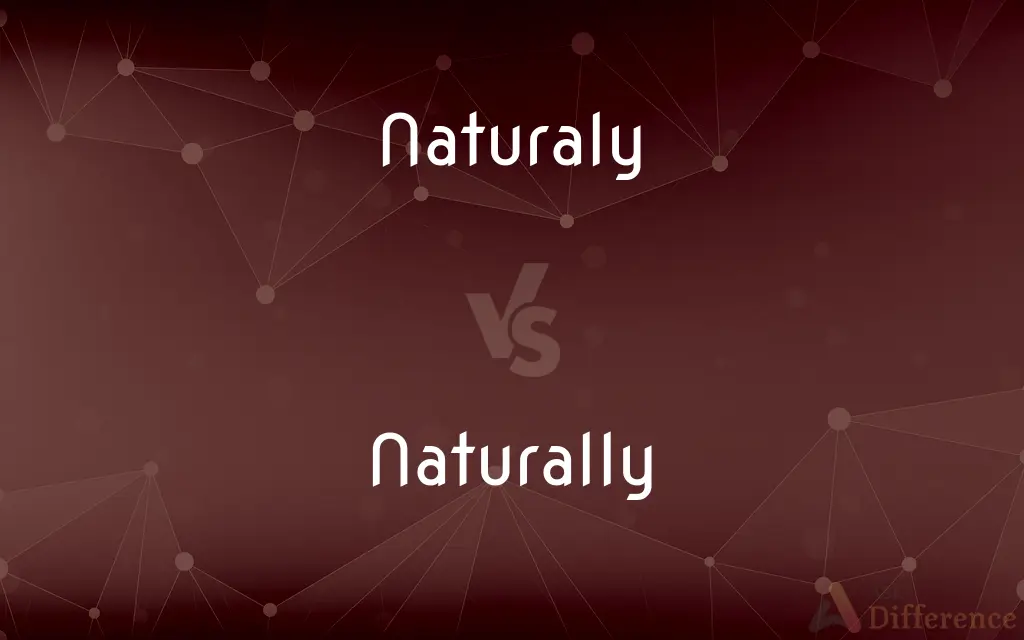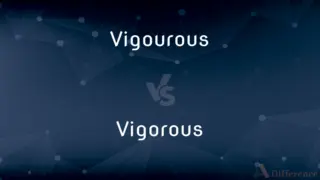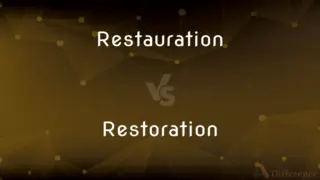Naturaly vs. Naturally — Which is Correct Spelling?
By Tayyaba Rehman — Updated on March 26, 2024
"Naturaly" is an incorrect spelling. The right form is "Naturally," meaning in a natural manner or of course.

Table of Contents
Which is correct: Naturaly or Naturally
How to spell Naturally?

Naturaly
Incorrect Spelling

Naturally
Correct Spelling
ADVERTISEMENT
Key Differences
Think of "natural" as the base word and just add "-ly."
Remember that most adverbs ending in "-ly" come from their adjective forms.
Contrast with words like "actually" that also double the 'l' before "-ly."
"Naturally" has two 'l's while "Naturaly" misses one.
Visualize "Nature" at the start, reminding you to double the 'l' before adding "-ly."
ADVERTISEMENT
How Do You Spell Naturally Correctly?
Incorrect: He moves naturaly on stage.
Correct: He moves naturally on stage.
Incorrect: The plant grows naturaly in this environment.
Correct: The plant grows naturally in this environment.
Incorrect: The ingredients blend together naturaly.
Correct: The ingredients blend together naturally.
Incorrect: She naturaly has curly hair.
Correct: She naturally has curly hair.
Incorrect: She responded to the criticism naturaly.
Correct: She responded to the criticism naturally.
Naturally Definitions
Without artificial intervention.
He sings with a naturally gifted voice.
In a manner or way that is expected or normal.
Birds naturally fly.
By inherent nature; instinctively.
Lions are naturally predators.
In a natural manner.
By nature; inherently.
Without a doubt; surely.
Inherently or by nature.
Boys are naturally aggressive.
Surely or without any doubt.
I shall naturally protest at that decision.
Would you like a glass of champagne, sir? - Naturally!
In a natural manner or way; according to the usual course of things; spontaneously.
As might be expected;
Naturally, the lawyer sent us a huge bill
Through inherent nature;
He was naturally lazy
According to nature; by natural means; without artificial help;
Naturally grown flowers
In a natural or normal manner;
Speak naturally and easily
Used to emphasize the truth or obviousness of a statement.
Naturally, she was the first to arrive.
Without the use of chemicals or synthetic agents.
This product is naturally derived.
Naturally Meaning in a Sentence
Water flows naturally downhill due to gravity.
She naturally assumed the leadership role in the group.
She smiles naturally, lighting up the room.
The flowers bloom naturally in the spring.
The vine climbs naturally, seeking sunlight.
He naturally excels at mathematics.
Birds naturally migrate when the seasons change.
Children learn to speak their native language naturally.
Fruits ripen naturally on the tree.
The body heals itself naturally from minor cuts.
She naturally gravitated towards the arts.
People naturally resist change.
The eye naturally tears when irritated.
Plants naturally filter the air by absorbing CO2.
He naturally blends in with any crowd.
Her hair curls naturally, without the need for a curling iron.
She has a naturally inquisitive mind.
Animals naturally adapt to their environments.
She can naturally sense when someone is upset.
Cats naturally hunt even when they aren't hungry.
He can solve complex problems naturally, without much effort.
He has a naturally calm demeanor.
The skin naturally produces oil to protect itself.
Babies naturally develop the ability to walk.
The moon naturally affects the tides on Earth.
Naturally Idioms & Phrases
Come naturally to someone
To be an innate ability or talent.
Math comes naturally to her; she's always been good with numbers.
As naturally as breathing
Doing something very easily and without much thought.
She plays the piano as naturally as breathing.
Common Curiosities
What is the verb form of Naturally?
Naturally is an adverb; it doesn’t have a verb form. However, "nature" is a related noun.
What is the root word of Naturally?
"Natural."
What is the pronunciation of Naturally?
/nætʃərəli/.
What is the plural form of Naturally?
Not applicable, adverbs don’t have plurals.
Is Naturally a noun or adjective?
Neither. It's an adverb.
Which vowel is used before Naturally?
Any vowel can precede it depending on the context, e.g., "a" in "a naturally occurring substance."
Which conjunction is used with Naturally?
Any can be used based on the sentence structure.
Why is it called Naturally?
Derived from "natural" with the adverbial suffix "-ly" to describe something done in a natural manner.
Is Naturally an adverb?
Yes.
Is Naturally a negative or positive word?
Neutral.
What is the singular form of Naturally?
Naturally (it doesn't have singular or plural forms as an adverb).
Is Naturally an abstract noun?
No.
Which preposition is used with Naturally?
Any can be used based on context, e.g., "naturally in the wild."
Is the word “Naturally” a Direct object or an Indirect object?
Neither, it's an adverb.
Is the Naturally term a metaphor?
Not inherently, but can be used metaphorically in context.
Is the word Naturally a gerund?
No.
How do we divide Naturally into syllables?
Nat-u-ral-ly.
What part of speech is Naturally?
Adverb.
Is Naturally a countable noun?
No, it's an adverb.
Is Naturally a collective noun?
No.
Is the word Naturally imperative?
No.
What is a stressed syllable in Naturally?
The first syllable, "Nat."
What is the opposite of Naturally?
Artificially.
What is the second form of Naturally?
Not applicable, as "Naturally" is not a verb.
Which article is used with Naturally?
Usually none, but depends on context.
Which determiner is used with Naturally?
None usually, but it depends on the context.
What is the first form of Naturally?
Not applicable, as "Naturally" is not a verb.
What is the third form of Naturally?
Not applicable, as "Naturally" is not a verb.
How is Naturally used in a sentence?
"Plants naturally produce oxygen through photosynthesis."
Is Naturally a vowel or consonant?
The word begins with a consonant.
How many syllables are in Naturally?
Four.
What is another term for Naturally?
Innately.
Share Your Discovery

Previous Comparison
Vigourous vs. Vigorous
Next Comparison
Hungery vs. HungryAuthor Spotlight
Written by
Tayyaba RehmanTayyaba Rehman is a distinguished writer, currently serving as a primary contributor to askdifference.com. As a researcher in semantics and etymology, Tayyaba's passion for the complexity of languages and their distinctions has found a perfect home on the platform. Tayyaba delves into the intricacies of language, distinguishing between commonly confused words and phrases, thereby providing clarity for readers worldwide.













































